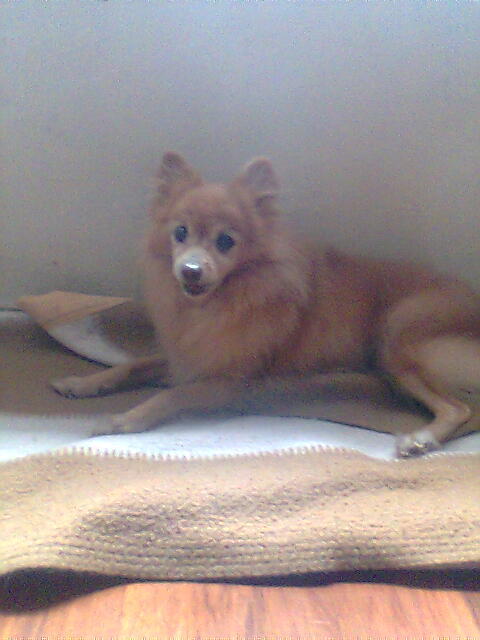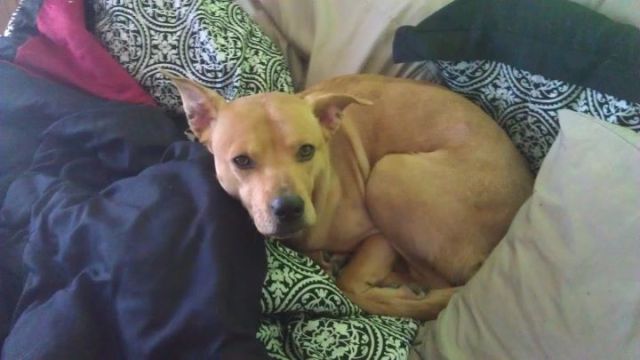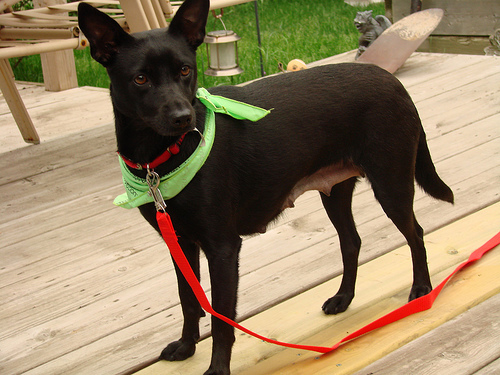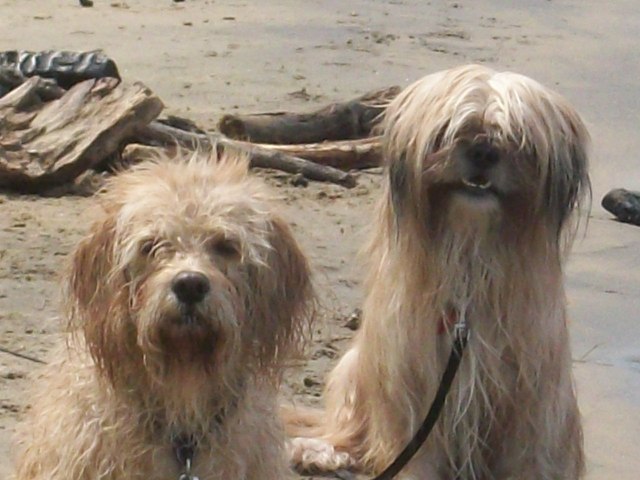Questioni have a 4 month old pitt boxer mix. buster is his name...he wont listen to a thing that i say its like he has a mind of his own...he tore apart the padding on my bed...poops whereever he wants...(i take him out all the time) terriozes the cats to the point i think that hes going to hurt them (they are all less than a year except one) chews on everything including cords (like my phone charger that cost me 100 bucks) the keybord to the computer...the computer and he also has a problem with biting me when i tell him no and point a finger at him...drew blood yesterday after telling him NO for the cats...i need help hes also into the litter box and wont stop weither i rub his nose into it or not...or if i clean it out every 10 minunits. sorry terrible spelling...i try to chain him up when hes bad but i cant do that all he does is wine and bark.. (it is a cute bark but thats besides the point)he is a loveable boy i love him to death and he always wants to be right next to me and wines when i leave him alone (he is used to having 10 brothers and sisters to play with) i just need him to stop and be a good boy or im going ot have to get rid of him and i dont wanna do that.. this is my first dog since my mini poodle passed away of old age 3 years ago (i had her for 13 years.) PLEASE HELP "
AnswerOther dogs may not be as bad as the young Labs I am plagued with. Still your house and dog will be much safer with the dog in a crate when you are away. The dog may be happier in its den than loose in the house. It relaxes, it feels safe in its den. It rests, the body slows down reducing the need for water and relieving its self. Dogs that have been crated all along do very well. Many of them will rest in their crates even when the door is open. I think the plastic ones give the dog more of a safe, enclosed den feeling. They are harder for dogs to open too. Metal ones can be put in a corner or covered with something the dog can't pull in and chew. Select a crate just big enough for the full grown dog to stretch out in.
Leave it some toys. Perhaps a Kong filled with peanut butter. Don't leave anything in the crate the dog might chew up. It will do fine without even any bedding. You will come home to a safe dog and a house you can enjoy.
A dog that has not been crated since it was little, make take some work. Start out just putting its toys and treats in the crate. Praise it for going in. If you have been able to trust it with any bedding, put that in the crate. Feed it in the crate. This is also an easy way to maintain order at feeding time for more than one dog.
Accidents and damaged possessions are the fault of whoever was watching the puppy. When you are watching it, immediately correct it as soon as it goes for anything except its own toys. In a quiet, but firm voice give it an ''Ah, ah, ah!''. Gently remove what ever and replace it with one of her toys, or if older, hold eye contact until the puppy drops it.
When you are around you need to keep a close eye on the dog. Use closed doors or gates to keep it in the same room as you are, and perhaps as I do, a short chain fastened to the computer desk. If you catch it in the act, give it a sharp ''Ah, ah, ah!'' and take it out. When you can't watch it, crate it.
Much of housebreaking is not training the puppy, but making it easier for your puppy, you, and your carpet while its body to catches up to its instincts. At around 8 weeks when the puppy goes to its new home, the time from when it realizes it has to go, and when it can't wait any longer is a matter of seconds. Only time will fix that. You can hardly be expected to be attentive enough to avoid all accidents. There is no sense punishing the puppy for your inattention. It is not fair to punish you either, but you still have to clean it up if you didn't have the puppy outside in time.
Housebreaking starts before you get home with the new puppy. If you don't have a crate, buy one. I prefer the more enclosed, den like plastic ones. Skip the bedding. At first it gets wet, and later it can be chewed into choking hazards. A wire grid in the bottom will help keep the puppy up out of accidents at first. They are available with the crates, but expensive and hard to find. A piece of closely spaced wire closet shelving from a home supply place is cheaper. I am now using a plastic vegetable bin with plenty of holes drilled in the bottom. It helps block off part of the crate for the smaller puppy. If you already have a metal crate, covering it may help. Just make sure you use something the puppy can't pull in and chew. Dogs that start out in crates as little puppies, accept them very well. Never leave an unattended puppy loose in the house. If nobody can watch it, put it in the crate. I suggest letting the dog have its crate all its life. A crate needs to be just big enough for a dog to stretch out in.
Choose a command and spot you want it to use. The less accessible to strays, the less chance of serious disease. If it is a female, choosing a non grassy spot will avoid brown spots later. When you bring it home, take it to the spot and give it the command in a firm, but friendly voice. Keep repeating the command and let the puppy sniff around. Sometimes you need to walk it around to stimulate its body to eliminate. If it does anything, praise it. Really let it know what a good dog it is and how much you love it, and maybe a treat. Note, being out there not only means you can praise it, but it also keeps it from being snatched by a hawk. If it doesn't go, take it inside and give it a drink and any meals scheduled. A young puppy will need to go out immediately afterward. Go to the spot and follow the above routine. Praising it if it goes is extremely important. If it doesn't go, take it back inside and put it in its crate and try again soon. Do not let it loose in the house until it does go.
At first it is your responsibility to know and take the puppy out when it needs to go. It needs to go out the first thing in the morning, after eating, drinking, and sleeping. If it quits playing, and starts running around sniffing, it is looking for a place to go. Take it out quickly. You will just have to be what I call puppy broke until it is a little older. How successful you are depends on how attentive you are.
By the time most dogs are about 3 months old, they have figured out that if they go to the door and stand, you will let them out. The praise slowly shifts to going to the door. Some people hang a bell there for the dog to paw. If your dog doesn't figure this out, try praising it and putting it out if it even gets near the door. When you catch it in the act, give it a sharp ''Ah, ah, ah!'' and take it out. Clean up accidents promptly. I mostly keep the little puppies out of the carpeted rooms. Still I need the can of carpet foam sometimes. First blot up all the urine you can with a dry towel. Keep moving it and stepping on it until a fresh area stays dry. A couple big putty knives work well on bowel movements. Just slide one under it while holding it with the other. This gets it up with a minimum of pushing it down into the carpet. This works with even relatively soft ones, vomit, dirt from over turned house plants, or anything else from solids to thick liquids. Finish up with a good shot of carpet foam. Note, do not let the puppy lick up the carpet foam. Once the dog is reliably housebroken, your carpet may need a good steam cleaning.
Many people strongly strongly push cleaning up all evidence of past accidents. I am slower to suggest that. Dogs will return to the same spot if they can find it. When you see one sniffing the spot, that is your clue to run it out.
The key to most behavior problems is approaching things using the dog's natural instincts. Dogs see all the people and dogs in the household as a pack with each having their own rank in the pack and a top dog. Life is much easier if the 2 legged pack members outrank the 4 legged ones. You can learn to play the role of top dog by reading some books or going to a good obedience class. A good obedience class or book is about you being top dog, not about rewarding standard commands with a treat.

 Mastitis
QuestionQUESTION: Good morning Karen.
My Pomeranian is
Mastitis
QuestionQUESTION: Good morning Karen.
My Pomeranian is
 why now?
Question
my dog
I have a 2 year old dog, that mo
why now?
Question
my dog
I have a 2 year old dog, that mo
 Guessing my dogs mix
Question
matilda
I was wondering if you could help what
Guessing my dogs mix
Question
matilda
I was wondering if you could help what
 Helpppp
Question
Maddy
I have a 9 month peekapoo. She is pad tr
Helpppp
Question
Maddy
I have a 9 month peekapoo. She is pad tr
 re: dog breed
Question
Dog pic question about
Hi Patti,
I took in a
re: dog breed
Question
Dog pic question about
Hi Patti,
I took in a